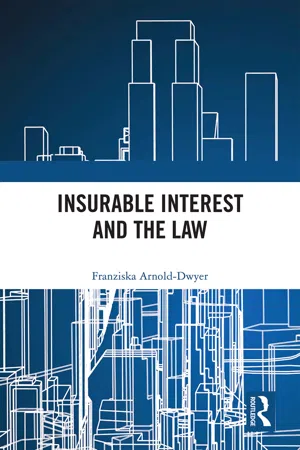
- 242 pages
- English
- ePUB (mobile friendly)
- Available on iOS & Android
Insurable Interest and the Law
About this book
This book assesses the role of the doctrine of insurable interest within modern insurance law by examining its rationales and suggesting how shortcomings could be fixed.
Over the centuries, English law on insurable interest – a combination of statutes and case law – has become complex and unclear. Other jurisdictions have relaxed, or even abolished, the requirement for an insurable interest. Yet, the UK insurance industry has overwhelmingly supported the retention of the doctrine of insurable interest. This book explores whether the traditional justifications for the doctrine – the policy against wagering, the prevention of moral hazard and the doctrine's relationship with the indemnity principle – still stand up to scrutiny and argues that, far from being obsolete, they have acquired new significance in the global financial markets and following the liberalisation of gambling. It is also argued that the doctrine of insurable interest is an integral part of a system of insurance contract law rules and market practice. Rather than rejecting the doctrine, the book recommends a recalibration of insurable interest to afford better pre-contractual transparency to a proposer as to the suitability of the policy to his or her interest in the subject-matter to be insured.
Providing a powerful defence for the retention of insurable interest, this book will appeal to both academics and practitioners working in the field of insurance law.
Frequently asked questions
- Essential is ideal for learners and professionals who enjoy exploring a wide range of subjects. Access the Essential Library with 800,000+ trusted titles and best-sellers across business, personal growth, and the humanities. Includes unlimited reading time and Standard Read Aloud voice.
- Complete: Perfect for advanced learners and researchers needing full, unrestricted access. Unlock 1.4M+ books across hundreds of subjects, including academic and specialized titles. The Complete Plan also includes advanced features like Premium Read Aloud and Research Assistant.
Please note we cannot support devices running on iOS 13 and Android 7 or earlier. Learn more about using the app.
Information
1 Introduction
2 The historical development of the insurable interest requirement
Formative period
Insurable interest under the lex mercatoria and common law
Take it that the law is settled, that if a man has no interest, and insures, the insurance is void, although it be expressed in the policy interested or not interested, and the reason the law goes upon, is the encouragement of trade, and not that persons unconcerned in trade, nor interested in the ship, should profit by it.3
Wager and wager policies
Table of contents
- Cover
- Half Title
- Title Page
- Copyright Page
- Table of Contents
- Abbreviations and definitions
- Table of cases
- Table of legislation
- 1 Introduction
- 2 The historical development of the insurable interest requirement
- 3 The legal bases for insurable interest
- 4 The meaning of insurable interest
- 5 Insurable interest – Quo Vadis?
- 6 The anti-wagering justification
- 7 The moral hazard justification
- 8 The indemnity justification
- 9 The integral dimension of insurable interest – insurance contract law
- 10 The integral dimension of insurable interest – policy terms
- 11 The definitional dimension of insurable interest
- 12 Remedies, enforcement and reform
- 13 Conclusion
- Bibliography
- Index